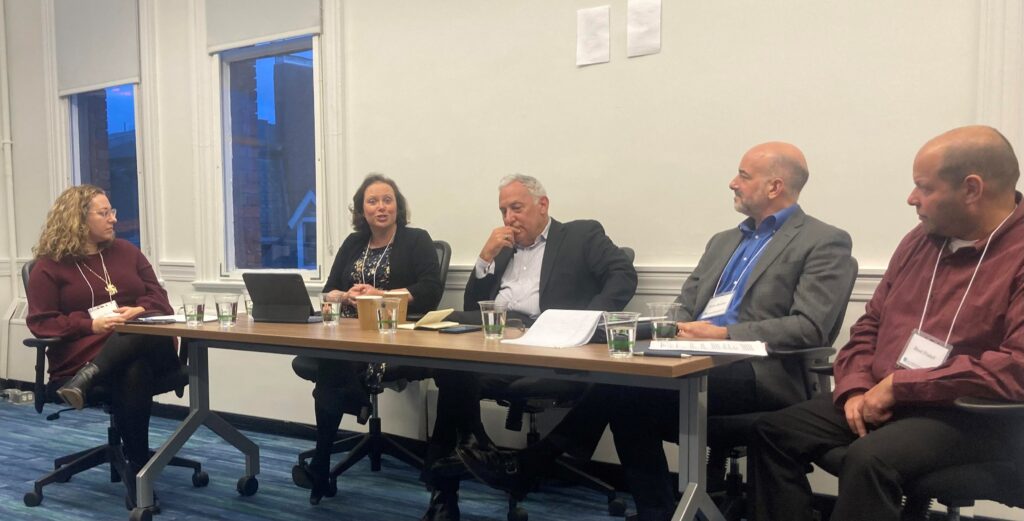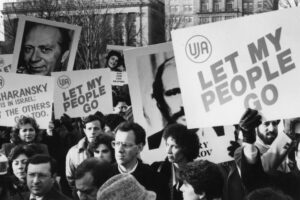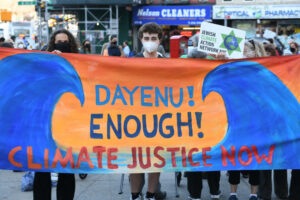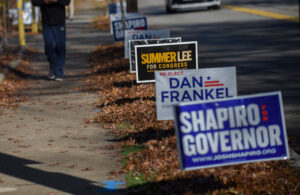In early January, Cohort III of the Executive Leadership program gathered in Boston for their final seminar. The theme was Jewish peoplehood, which we examined through faculty and fellow-led sessions on topics such as modern Jewish identities, antisemitism in historical and contemporary contexts, and Israel-diaspora relations. A centerpiece of the seminar was a group inquiry project examining how social activism can influence Jewish peoplehood. Guided by visiting faculty, the fellows examined the Soviet Jewry movement alongside more recent campaigns that seek to mobilize Jews across lines of religious and political difference.
The seminar culminated with the fellows’ presentations of their capstone vision statements to an audience of peers and special guests. Crafted in the style of public narrative, the fellows’ speeches drew upon their formative experiences and deeply held commitments to chart distinctive pathways for their leadership in the years ahead. Special guests for the vision statements included Eric Fingerhut and Liz Fisher, CEO and President and Chief Talent Officer of the Jewish Federations of North America, and Doron Krakow, CEO and President of the Jewish Community Centers Association of North America, as well as the program’s cadre of mentors.
To honor the fellows’ 18-month cohort learning experience, the seminar concluded with a graduation ceremony. Mandel Foundation CEO and President Jehuda Reinharz and Mandel Foundation Chairman and program mentor Stephen Hoffman, addressed the graduates, commenting on the leadership challenges the fellows face, as well as the global community of Mandel graduates that they will now be joining. Congratulations to Cohort III for your accomplishments as fellows of the Executive Leadership Program!
Three Generations of Leadership

Left to right: Abbey Feinberg, Naomi Adler, Eric Fingerhut, Doron Krakow, Brad Finkel
During Cohort III’s final seminar in the Executive Leadership Program, fellows Abbey Feinberg and Brad Finkel moderated a panel discussion with fieldwide leaders of Jewish organizations: Naomi Adler, CEO of Hadasah, Eric Fingerhut, President and CEO of The Jewish Federations of North America (JFNA), and Doron Krakow, President and CEO of the JCC Association of North America. Discussion topics included strengths and challenges in the Jewish non-profit sector, navigating times of political polarization, balancing work and personal life, and strategies for improving the quality of the Jewish communal experience.
The panelists merged industry knowledge, lived experience, and visions for leadership change throughout the conversation. Adler emphasized the importance of leading with respect and understanding for others, in order to truly recognize and appreciate the diversity of the Jewish community. Fingerhut posed the challenge of finding commonalities among our differences in order to realize the power of collective action. Krakow highlighted the value of being proactive in seeking mentorship opportunities and resisting the urge to be heard on every single issue. From all our panelists, fellows gained valuable insights and advice to tackle challenges, collaborate, and lead with integrity.
Later, fellows, panelists, and the program’s mentors—including previous leaders of JFNA, JCC Association and other national organizations—continued the conversation in small groups. Altogether, three generations of leaders were represented for our wide-ranging conversations!
Social Movements: Soviet Jewry, Climate Change, and Democracy



One special component of Cohort III’s final seminar in the Executive Leadership Program was a half-day session focused on the influence of social movements on Jewish peoplehood. Sociologist, author, and professor Shaul Kelner spoke about the Soviet Jewry movement, a historical example of collective action that not only helped to liberate Soviet Jews but also generated much stronger feelings of Jewish solidarity. Other guests examined contemporary mobilizations that, like the Soviet Jewry movement, hold open the possibility of strengthening Jewish peoplehood. Jennifer Rosenn, Founder and CEO of Dayenu, a Jewish organization focused on combatting the climate crisis, discussed the power of harnessing Jewish spiritual and cultural resources to mobilize and sustain action against climate change. Aaron Dorfman, Founder and Executive Director of A More Perfect Union, highlighted the importance of preserving and protecting democracy- a core tenet of American Jewish life and identity.
Soviet Jewry Movement
Shaul Kelner’s lecture helped fellows deepen their understanding of the Soviet Jewry movement, a decades-long campaign to advocate for and show solidarity with Soviet Jews facing persecution. From the 1960’s-1980’s, Jews in the Soviet Union sought to gain freedom from their oppressive government, prompting Jews worldwide to mobilize in support of religious liberty and the right to emigrate. Kelner described the movement as one which “infused American Jewish life with purpose.” Whether through rallies, boycotts, freedom runs, holiday rituals, or new art and education curricula, grassroots activism through Jewish organizations surged. Jews across America and around the world united for the cause, and as Kelner explained, “activists created ways for regular, everyday people to get out there and put the issues and causes into their own words.”
So, where is the next Soviet Jewry movement? Fellows next heard from national leaders of contemporary initiatives that, like the Soviet Jewry movement, seek to mobilize and unite Jews on issues of national and global importance.
Dayenu: Combatting the Climate Crisis
Dayenu CEO Rabbi Jennifer Rosenn explained that approximately 80% of American Jews are concerned about the climate crisis but that far fewer are taking action to address the issue. This is because, in Rosenn’s view, people are unsure how to help, or paralyzed by the sheer magnitude of the issue. Such hesitation to act is one of the leading reasons Rosenn created Dayenu—to build a social movement that creates opportunities for the Jewish community to marshal its resources in the fight against climate change. Dayenu’s core pillars include bold action, movement building, and spiritual adaptation—all aimed at equipping Jews, especially youth, with the spiritual and emotional resources to tackle climate change. Dayenu’s work has also evolved at the local level through “Dayenu Circles”—small, multi-generational groups of Jews that learn about and organize action on climate change.
A More Perfect Union: Protecting Democracy
Aaron Dorfman, Founder and Executive Director of A More Perfect Union, launched the organization because political polarization was, and continues to be, a pervasive threat to America’s democracy and democratic institutions. Dorfman’s goal is to bring together Jewish engagement and pro-democracy work under one action-oriented organization, committed to bringing diverse voices to the table. The organization is animated by two core beliefs: Jews in America have flourished because of the strong rule of law and protection for civil rights and the fight to strengthen America’s democracy requires cross-denominational, cross-ideological and multi-sector cooperation. A More Perfect Union’s Strategic Advisory Group is a manifestation of this approach, with leaders across the political spectrum that can ensure ideological diversity and mobilize collective action among a wide range of Jewish and civic institutions.
Drawing Connections
Following presentations from Kelner, Rosenn and Dorfman, fellows deliberated on the role of social movements in the strengthening of Jewish peoplehood. They also reflected on the significance of thinking about themselves as potential social movement leaders as well as nonprofit professionals.
In relation to Dayenu, fellows analyzed how to balance climate change with other pressing issues, and how to forge capacity for bipartisan action. They also asked how climate change aligns with the missions of various Jewish organizations, and explored ways of forming these connections.
In conversation regarding A More Perfect Union, fellows discussed how to address political polarization within their own Jewish communities. They examined the concept of milestones, asking whether intermediary markers can be developed to measure whether we are, or are not, achieving a more democratic society.
Summing up, Dorfman suggested that we are at an inflection point where identification with a particular political party has become stronger than identification with the Jewish people. As Jewish community leaders, fellows have the opportunity to bring diverse stakeholders together to strengthen the country’s democratic fabric and possibly that of the Jewish people at the same time.
Hanna Paris
